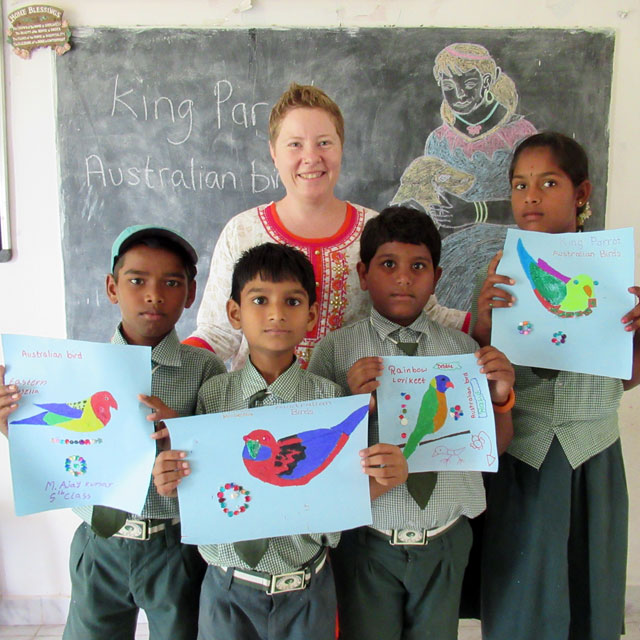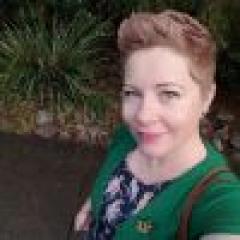Interested in studying social work? Learn more about the Master of Social Work Studies at UQ and make a difference in the lives of others.
I was over the moon when I found I had been successful in my application for a grant to go overseas for the second placement of my Master of Social Work Studies. I have always wanted to work in other countries, and I love learning about different cultures and ways of doing and being, so the decision to apply for an international placement was a no-brainer for me.
I arrived in India with a positive attitude and a determination to be flexible and make the most of whatever opportunities I found. After a week or so of enjoying the culture shock of Bangalore and talking with our Indian placement co-ordinator Augustine, we headed off on the 140km journey to the small rural village of Mulakalapalli, near Penukonda, in Andhra Pradesh.
The organisation I am working with is called the Social Education and Development Society (SEDS). SEDS is a grassroots non-governmental organisation in the Anantapur district, a drought prone area in the south western part of Andhra Pradesh, in southern India. Started by Rajen Joshua and his wife Manil in 1981, sustained efforts by SEDS have made a significant impact on the lives of the people in the area and the local environment. Programs include watershed management, reforestation, education, health, empowering women, sustainable farming methods, and finding environmentally friendly fuel alternatives for cooking.
I am currently a few weeks into my placement, and am still working on figuring out the best way to combine my own learning experiences with making genuine contributions to the work of SEDS. One of the ways in which I have been asked to ‘give back’ is to regularly work at SEDS’ school, Ananda Vidyalayam Primary School, teaching English. I was keen to get stuck into this task, although I was more than a little nervous as I have never taught before. Luckily, the kids are fantastic and they are hungry to learn, making teaching them a pleasure. To help me work out a teaching style, I have drawn on a number of previous experiences. One source of help to me was the Lifespan, Culture, and Disability course from the first year of my masters degree, which looks at development throughout life. I used this learning to help me tailor my approach for the children while also noticing the differences in development that children here seem to show compared to western children. For example, the children seem more physically dextrous and coordinated from a very young age. Even the small children manage plenty of tasks that we would expect the parents to complete for their children in most Australian families. Other valuable sources of information for me included reflecting on things that a good friend of mine, who is a primary school teacher, has mentioned to me over the years, plus my own personal experiences of learning foreign languages.
Once I felt more comfortable with the teaching aspect of helping at the school, I spent time considering my role at the school from a community development perspective. It is great for the children to have experience of learning from a native English speaker, but this will be a short-term arrangement as my placement ends in October. I therefore looked into the possibility of conducting some training with the teachers themselves. This could be a longer-term solution, however in reality the teachers often leave for better-paying roles and better-resourced schools once they upskill, taking these skills with them. I have decided instead that I will compile as many teaching resources as possible, such as lesson plans and activities, information about language teaching, websites the teachers can learn from and get other ideas. These resources can remain at SEDS, and be available for all teachers, including those employed in the future. I am also in the process of designing a fundraising scheme for the school, which will be reciprocal and able to continue in a sustainable manner. This will provide funding for teacher salaries, school equipment, uniforms for the children, transport costs, and so on. In return, the SEDS school can provide cultural learning opportunities for other primary schools in Australia.
It is early days yet on this placement, but I am already considering my input in terms of sustainability, to draw upon other non-social work skills and not be afraid to step outside of my comfort zone with the contributions I can offer. I have learnt to reflect on the work that makes me feel good versus the work that might actually help in the longer term, and to really value my own knowledge and the knowledge and experience that surrounds me in all of the people that I come into contact with here. SEDS staff, school teachers, villagers, children – every one of them knows things that I don’t, and by being open to learning from everyone I meet I hope to really make the most of this incredible opportunity.
Study at UQ
Find out more about the Master of Social Work Studies at UQ.

